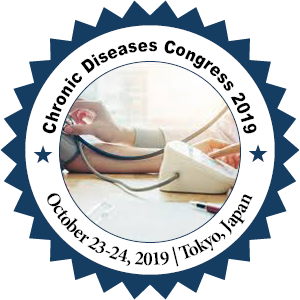Alonge Ivo Ebule
University of Buea Cameroon/School of Laboratory Technicians Yaounde
Title: High Prevalence of Helicobacter pylori Infection, Atrophic Gastritis and Hypochlorhydria in HIV-Positive Cameroonians tested by Serological Stomach-Specific Biomarkers
Biography
Biography: Alonge Ivo Ebule
Abstract
Background: Human Immunodeficiency virus (HIV) and Helicobacter pylori(H. pylori)are associated with significant d chronic inflammation of the gastric mucosa. Gastric inflammation is a precursor to many gastrointestinal disorders including, peptic ulcer, atrophic gastritis (AG) and gastric cancer (GC). AGis usually accompanied by low hydrochloric acid(hypochlorhydria), low pepsinogens (PG) and high gastrin (G) levels and is the most significant risk condition for GC. Acid-free stomach is a risk factor for impaired drug absorption including anti-retroviral therapy and antibiotics. We assessed the prevalence of H. pylori infection, AG and acid-free stomach (hypochlorhydria) amongst HIV/AIDS subjects in Cameroon.
Methods: 84 HIV/AIDS subjects were recruited in Yaounde during January-May 2018. Clinical and socio-demographic data of the subjectswere recorded. 5 ml of blood was aseptically collected for analysis by GastroPanel® biomarker test for PGI, PGII,G-17 and H.pylori IgG antibodies. GastroPanel results were interpreted using the software application GastroSoft® (Biohit). Statistical analyses were run by Epi info 7.0.
Results: 84 subjects were recruited,aged between17-63 years(mean 37.6 ± 8.9 years). H. pylori seropositivity (IgG ≥30 EIU) was detected in 68(81.0%) of the subjects. H. pylori seropositivity was closely associated with low CD4 counts (p=0.01). Altogether, 26(31.0%) of the subjects presented with AG of the corpus, while, hypochlorhydria (acid-free stomach) was detected in 32(38.1%) of the patients. AG and hypochlorhydria were associated with low CD4 counts<200μl/l (p=0.01) and (p=0.005), respectively.
Conclusion: H. pylori infection, AG and acid-free stomach were common among HIV/AIDS patients, associated with an increased risk for GC and impaired absorption of micronutrients and some medicines.

